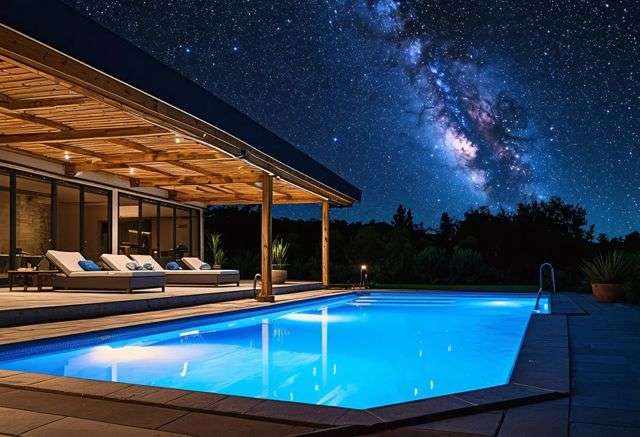
Dealing with Heat Loss for Pools During Night Time

To deal with heat loss for pools during nighttime, consider using solar blankets, liquid solar covers, or wind blocks. These methods significantly reduce heat loss by minimizing evaporation and direct cooling by wind.
Understanding Heat Loss in Pools at Night
Heat loss in pools during the night can be attributed to several factors:
- Evaporation: As water evaporates from the pool surface, it takes heat with it. This is one of the main causes of nighttime heat loss.
- Conduction: Heat is also lost through direct contact with cooler air and surfaces, which cools down the pool water.
- Environmental Factors: Wind can significantly lower pool temperature by increasing the rate of evaporation and cooling the water directly.
To mitigate these factors, consider the following strategies:
- Liquid Solar Cover: This cover forms a thin layer on the water, reducing evaporation by up to 50% and trapping heat.
- Solar Blanket: These blankets use UV rays to heat the water and trap the heat, while also preventing evaporation.
- Solar Sun Rings: Made from UV-resistant vinyl, these rings provide excellent heat retention and are easier to manage compared to full blankets.
- Wind Blocks: Installing hedges, fences, or other structures can block wind and protect pool heat without obstructing the pool’s view for safety.
Additional methods include:
- Foam Boards: Placing foam boards on the water surface can provide extra insulation and reduce temperature drops significantly.
- Insulating Walls: Wrapping pool walls with materials like black plastic wrap or Styrofoam boards can help retain heat.
- Solar Panels: Installing solar panels can help raise water temperature during sunny days, making it easier to retain heat at night.
By understanding these causes and utilizing these strategies, pool owners can significantly reduce heat loss and maintain a warmer pool throughout the night.

Benefits of Using Solar Covers
Solar covers are an excellent solution for retaining pool heat during the night. These covers work by capturing the sun’s heat during the day and then preventing it from escaping at night. They can raise the water temperature by several degrees, making your pool more comfortable.
Types of solar covers include:
- Bubble Covers: Lightweight and cost-effective, these covers have air bubbles that trap heat.
- Vinyl Covers: Heavier and more durable, providing better insulation.
- Liquid Covers: A thin layer of liquid that reduces heat loss and evaporation.
Additional benefits of using solar covers are:
- Reduced water evaporation: A solar cover can save up to 50% to 70% of water that would otherwise evaporate.
- Lower chemical usage: By reducing evaporation, solar covers also minimize the loss of pool chemicals, saving you money.
- Cleaner pool: Covers keep debris out, reducing the need for frequent cleaning.
Using solar covers is an efficient and environmentally friendly way to maintain your pool’s temperature while saving on water and maintenance costs.
Liquid Pool Covers as an Alternative
Liquid pool covers offer an innovative solution for retaining heat in your pool during the night. These covers form a thin, invisible barrier on the water’s surface, reducing heat loss.
Traditional solar covers, on the other hand, are bulky and require manual placement and removal. Liquid covers eliminate this hassle, providing continuous protection.
Key benefits of liquid pool covers include:
- Easy application: simply pour into the pool.
- Minimal maintenance: no need for storage or cleaning.
- Effective heat retention: traps heat similarly to solar covers.
Compared to traditional solar covers, liquid covers are a convenient, low-maintenance option that helps maintain warmer pool temperatures.

Additional Tips to Minimize Heat Loss
To minimize heat loss from your pool during the night, consider these practical strategies:
- Use Windbreaks: Install barriers like fences or dense shrubs around your pool. They reduce wind speed over the water, which can significantly lower heat loss. For more ideas on incorporating natural windbreaks, check out our blog on Avoiding Invasive Plants in Your Patio.
- Proper Landscaping: Surround your pool with plants and structures that provide natural windbreaks. Well-placed trees and bushes can shield your pool from cool breezes. Discover more landscaping tips in our post on Colorful Tree Suggestions for Patios.
- Efficient Pool Heaters: Make sure your pool heaters are in good working order. Regular maintenance ensures they run efficiently, which can help maintain your pool’s temperature with less energy.
Additionally, consider implementing these tips for better results:
- Use Solar Covers: These covers can greatly reduce heat loss by trapping the heat in the water.
- Adjust Water Features: Turn off waterfalls and fountains at night. Moving water loses heat faster than still water.
For professional assistance in incorporating windbreaks, landscaping, and efficient pool heating systems, visit our Pool Remodeling service page. You can also explore our Artificial Turf and Patio Remodel services to enhance the overall aesthetics and functionality of your outdoor space.
Don’t miss out on improving your pool experience! Get your free estimate today!

FAQ
What are the main factors contributing to heat loss in pools at night?
Heat loss in pools at night is mainly due to evaporation, conduction, and environmental factors such as wind.
How can wind blocks help maintain pool temperature?
Installing hedges, fences, or other structures can block wind and protect pool heat without obstructing the pool’s view for safety.
What are some additional methods for reducing heat loss at night?
Additional methods include using foam boards for insulation, wrapping pool walls with insulating materials, and installing solar panels to raise water temperature.
What are the benefits of using solar covers for pools?
Solar covers can raise water temperature by several degrees, reduce water evaporation, lower chemical usage, and keep the pool cleaner.
What types of solar covers are available?
Types of solar covers include bubble covers, vinyl covers, and liquid covers.
How do liquid pool covers differ from traditional solar covers?
Liquid pool covers form an invisible barrier on the water’s surface, providing continuous heat retention without the need for manual placement and removal.
What are the key benefits of using liquid pool covers?
Liquid pool covers are easy to apply, require minimal maintenance, and effectively trap heat similarly to traditional solar covers.
What practical strategies can minimize heat loss from pools at night?
Practical strategies include using windbreaks, proper landscaping, efficient pool heaters, and turning off water features at night.
